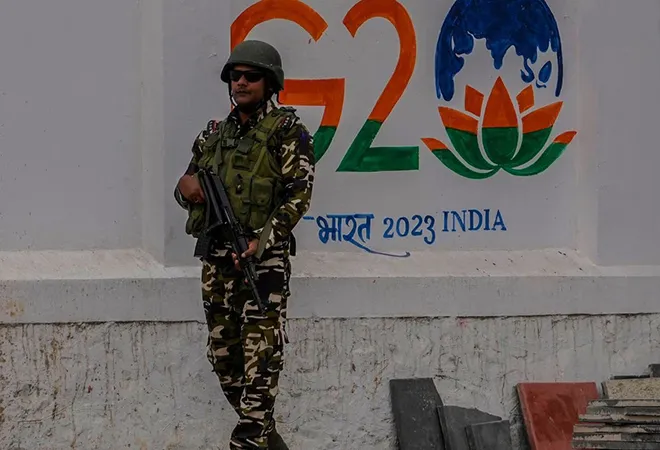-
CENTRES
Progammes & Centres
Location

While the G20 has looked at cybersecurity issues from the digital economy viewpoint, cybersecurity and its linkages to law enforcement cannot be overlooked.
Last week, India’s Ministry of Home Affairs (MHA) held the “G20 Conference on Crime and Security in the age of NFTs, AI and Metaverse” as part of India’s ongoing presidency of the grouping. This first-of-its-kind convening brought together senior officials and representatives of the G20 member-states’ law enforcement agencies, international security organisations and India’s national security community. The meeting discussed diverse issues like securing digital public infrastructure, challenges posed by the darknet and crypto-currencies, and opportunities for international cooperation. Given the G20’s usual focus on financial, development, and global governance issues, this meeting is significant as it widens the grouping’s ambit to address cybersecurity challenges and new-age crimes.
At the international level, law enforcement agencies have cracked down on many of these marketplaces and shut them down.
As underlined by the Home Minister Amit Shah’s opening speech at the conference, technology today is a double-edged sword. While it has brought obvious benefits and connected humanity, bad actors with malafide intentions have also used it to cause harm and commit violence. National security agencies globally have faced threats from cyberspace for some time. However, constant technological advances in the form of ransomware, darknet, crypto-currencies and Metaverse have complicated the threat landscape for law enforcement.
The most significant challenge comes from darknet marketplaces. Websites like Genesis Market and Hydra (both now shut down), enabled by The Onion Router Technology, have provided an anonymous but thriving cyberspace for criminal elements to sell narcotic substances, contraband, stolen personal and financial data, along with tools for committing cybercrimes. At the international level, law enforcement agencies have cracked down on many of these marketplaces and shut them down. This has certainly affected their revenue generation ability. According to Chainalysis, in 2022, darknet marketplaces generated revenue worth US$ 1.5 billion, down from US$ 3.1 billion in 2021. However, such crackdowns have proved to be temporary setbacks in the past as, generally, newer marketplaces have surfaced to replace old ones, selling even wider types of contraband to commit more sophisticated cybercrimes.
The exponential growth in cybercrimes targeting businesses and critical national infrastructure in recent years has been primarily driven by ransomware, where cyber criminals and hacking syndicates have exploited countries’ and corporations’ need for non-stop functioning of their computer networks. With the increasing volume of ransom payments, ransomware attacks have become a lucrative business for cybercriminals. This has also given rise to services like ‘RaaS’ (Ransomware-as-a-service), whereby malware coders rent out ransomware and its control infrastructure to cybercriminals for attacks and data breaches.
With the increasing volume of ransom payments, ransomware attacks have become a lucrative business for cybercriminals.
Payments on darknet marketplaces and for ransoms in ransomware incidents are made in cryptocurrencies like Bitcoin, Ethereum, and Monero, which have now become a preferred tool for cybercriminals. The decentralised nature of cryptocurrencies, the anonymity of their transactions and their widely fluctuating value have attracted nefarious elements to utilise them for cybercrimes. These characteristics also make it difficult for law enforcement agencies to track them down.
Besides these, there are new emerging dimensions of criminal activity like online gaming which have proved to be flourishing sanctuaries for hacking, identity theft, cyberstalking, doxing and social engineering attacks. Then there are Non-Fungible Tokens which also have been linked to crime payments and wash trading, a form of money laundering. On the other end of the spectrum is Metaverse, the online immersive environment, which is giving rise to concerns like child safety and simulated attack scenarios. The European police organisation, Europol, has already flagged the terrorist organisations’ potential use of Metaverse for propaganda, recruitment and training.
These tech advancements underscore the importance of international cooperation for law enforcement agencies to tackle and prevent new-age crimes, as their consequences and implications national boundaries. This international cooperation has three aspects: information-sharing, forensic investigations and skills and capacity building.
The European police organisation, Europol, has already flagged the terrorist organisations’ potential use of Metaverse for propaganda, recruitment and training.
Domestically, India has placed a strong emphasis on information-sharing among law enforcement agencies to tackle terrorism and other transnational crimes. For instance, MHA has expedited the implementation of initiatives like the Natgrid and Crime and Criminal Tracking Network and System and the Indian Cybercrime Coordination Centre, which have facilitated information-sharing among national and state-level law enforcement agencies. Simultaneously, the government has paid attention to augmenting cyber forensic capabilities. The MHA’s plan of establishing cyber forensic laboratories cum training centres all over India is well underway, with 33 states/Union Territories (UT) already covered.
India is now seeking to replicate this template globally by stressing the value of international cooperation. Last year in November, New Delhi held the Third Ministerial ‘No Money for Terror’ conference, where Indian officials highlighted the need to tackle advanced means of terrorist financing. This meeting followed two other important convenings in India in October 2022: the United Nations Security Council’s special meeting of the Counter-Terrorism Committee and the 90th INTERPOL (International Criminal Police Organization) General Assembly, which discussed evolving a coordinated approach by leveraging best practices and learnings from each other. These meetings have helped to draw attention towards the dark side of emerging technologies and their implications for law enforcement.
Last week’s G20 convening hosted by the MHA must be seen against this backdrop. By initiating a dialogue on the implications of emerging technologies for law enforcement and stronger cybersecurity regulations, this meeting has demonstrated G20’s utility to act on tackling new-age crimes. So far, the grouping has looked at cybersecurity issues from the digital economy viewpoint. While that remains an important perspective, in a rapidly digitalising world, cybersecurity and its linkages to law enforcement cannot be overlooked. With global cyber cooperation in limbo due to geopolitical polarisation between Eastern and Western camps, it is indeed the responsibility of the G20 to take up the mantle of cybersecurity and contribute to member-states’ security by focusing on its law-enforcement dimensions.
Harsh Pant heads the Strategic Studies Programme at Observer Research Foundation.
Sameer Patil is a Senior Fellow at Observer Research Foundation.
The views expressed above belong to the author(s). ORF research and analyses now available on Telegram! Click here to access our curated content — blogs, longforms and interviews.

Professor Harsh V. Pant is Vice President – Studies and Foreign Policy at Observer Research Foundation, New Delhi. He is a Professor of International Relations ...
Read More +
Dr Sameer Patil is Director, Centre for Security, Strategy and Technology at the Observer Research Foundation. His work focuses on the intersection of technology and national ...
Read More +